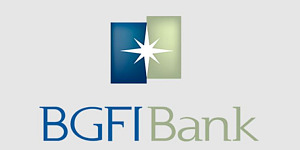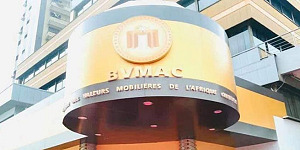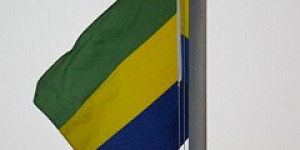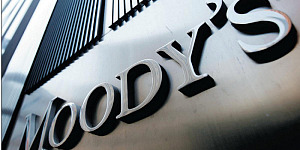 Fitch Ratings affirmed Gabon's Long-term foreign and local currency Issuer Default Ratings (IDRs) at 'BB-' and its Short-term foreign currency IDR at 'B'. The Outlooks on the Long-term IDRs are Stable. Fitch has also affirmed the Country Ceiling for Gabon at 'BBB-', in line with the Country Ceiling for Communaute Economique et Monetaire d'Afrique Centrale (CEMAC) and for the Union Economique et Monetaire Ouest-Africaine (UEMOA) at 'BBB-'.
Fitch Ratings affirmed Gabon's Long-term foreign and local currency Issuer Default Ratings (IDRs) at 'BB-' and its Short-term foreign currency IDR at 'B'. The Outlooks on the Long-term IDRs are Stable. Fitch has also affirmed the Country Ceiling for Gabon at 'BBB-', in line with the Country Ceiling for Communaute Economique et Monetaire d'Afrique Centrale (CEMAC) and for the Union Economique et Monetaire Ouest-Africaine (UEMOA) at 'BBB-'.
KEY RATING DRIVERS
The affirmation of Gabon's sovereign ratings reflects the following key rating drivers:
- Oil production declined to 11 million tons in 2013 from 11.6 million tons in 2012. A modest pickup in output is expected for 2014, due to operators' new techniques to drill the marginal fields, but in the absence of further investment, production will at best stagnate in 2015. Despite its status as a mature producer, the on-going exploration and discoveries in deep-sea underscore the untapped potential of Gabon, but which would only materialise later in the decade while uncertainties remain over the economic viability of those fields.
- As a result of lower oil revenue and high current expenditure, the government was only able to avoid posting a fiscal deficit in 2013 by putting capital expenditure on hold in Q4. In addition, the government failed to raise as much funds as expected in the local market in 2H13 and faced stress in its cash flow management. This implies a high 'break even' oil price of around USD100 per barrel and highlights the vulnerability of public finances to shocks on oil prices and production. Should oil revenue continue to decline, the government will post fiscal deficit from 2015 unless it cuts back on its capital expenditure programme (running above 10% of GDP).
- Gross government debt grew to an estimated 26% of GDP at end-2013, as Gabon issued a USD1.5bn eurobond in December 2013 (around 8.5% of GDP), repayable in three equal tranches in 2022, 2023 and 2024. Some of the proceeds have been used to almost fully retire the 2017 eurobond, build up the sinking fund for the remainder of the 2017 bond as well as to fund future investment. However, debt is primarily foreign currency-denominated and local capital markets are under-developed. Fitch views public finance management as a weakness.
- Economic growth remained fairly strong in 2013, at an estimated 5.6%, due to robust performance of the non-oil sector, which grew 7.9%. The government's investment programme continued to boost construction and public works. The decline in oil production is expected to be partly mitigated over the medium term by strong public investment and growth in manganese mining, agriculture, timber and services. The Gabonese state embarked on an ambitious public investment programme in 2010, aimed at improving infrastructure, in particular in the power and transportation sectors to help diversify the economy, which remains highly dependent on oil.
- Gabon's current account surplus fell below 8% in 2013, from nearly 20% in 2012, and is expected to decline gradually as a result of falling oil production. Net external debt is rising and although still low at only 8.9% of GDP, compares with a strong net creditor position for similarly rated African oil producers Angola and Nigeria.
- Gabon has a high GDP per capita of over USD10,000, more than double the 'BB' range median. However, levels of human development are lower than its rated peers. Governance and the business climate are weak, according to indicators from the World Bank.
- Data quality is weak and constrains the ratings. Fiscal and economic management is hampered by the poor quality and timeliness of balance of payment and fiscal data.
RATING SENSITIVITIES
The main risk factors that could, individually or collectively, trigger a negative rating action are:
- A deterioration in fiscal balances leading to further rises in public debt over the medium term
- Further deterioration of fiscal and debt management that would lead to the build-up of large arrears or would affect liquidity ratios
- A severe and sustained fall in oil prices or production
- A further significant rise in Gabon's net external debt
- A deterioration of the business environment affecting prospects for either the oil or the non-oil sectors
The main risk factors that could, individually or collectively, trigger a positive action are:
- Large oil discoveries leading to a turnaround in oil production
- Successful diversification of the economy over the long-term
- Improvement in the sovereign balance sheet or in public finance management, for example, through the accumulation of sovereign assets or better levels of governance and transparency
KEY ASSUMPTIONS
- Fitch assumes a gradual reduction in Gabonese oil output over the medium to long term
- Fitch assumes that oil price (Brent) will be USD105 per barrel in 2014 and USD100 in 2015
- Fitch assumes capital expenditures will remain above 10% of GDP in 2014 and 2015, and then progressively decrease
- Fitch assumes no break-up of the CEMAC monetary zone in the foreseeable future
- The agency assumes broad political and social stability is maintained, including around the 2016 Presidential elections






































